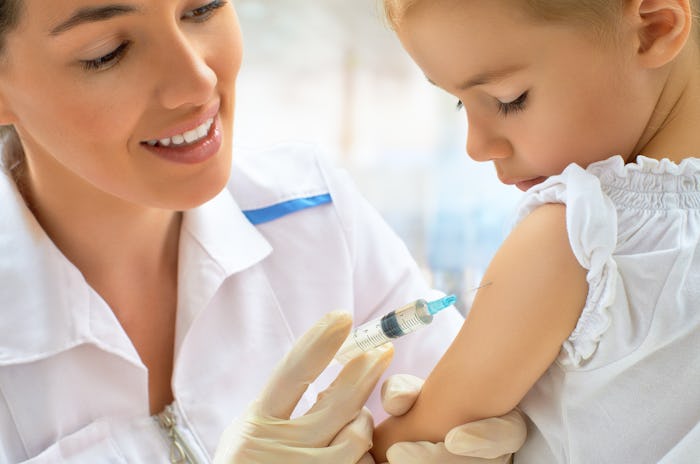News
The Percentage Of Unvaccinated Kids Under 2 Is Rising, According To The CDC
Debates around vaccination have become a hot topic across the United States, with anti-vaxxing movements popping up all over. It might be easy to brush off these movements as fringe groups, but recent studies are showing that this rhetoric does have influence. New federal data shows that the percentage of unvaccinated kids under 2 is rising, according to the CDC, and that's a big problem.
The number of parents seeking vaccine exemptions for their children has been climbing since the 1990s. Part of this can be tied to a fraudulent paper, which claimed vaccines cause autism. The influence of the anti-vaxxing movement may not stretch incredibly far if looking solely at numbers, but it's still important to note where it does have effects.
In 2017, Minnesota dealt with the largest measles outbreak in 30 years, primarily among Somali children. It was an example of what happens when anti-vaxxing movements target immigrant communities, Vox reported. As noted by the Minnesota Department of Health, the Somali community had been purposefully targeted with misinformation around vaccinations.
Many people, from health workers to researchers, government officials, and beyond, have worked to combat anti-vaxxing movements. However, those movements are still influencing some parents, and that's important to be aware of.
Since 2001, the percentage of kids under two who have not received vaccinations has quadrupled, according to Scary Mommy. The CDC's analysis found that, of children born in 2015, 1.3 percent hadn't received any of the recommended vaccinations. That can be compared with 0.9 percent in 2011 and 0.3 percent of children who hadn't received any vaccinations when surveyed in 2001, as noted by The Washington Post.
If you assume the same proportion of kids born in 2016 didn't get immunized, that means around 100,000 kids under two are totally unvaccinated right now, as broken down by Scary Mommy.
Sure, the number might seem small when you remember there's a lot of kids in the United States. But, those small numbers can still have negative consequences, as shown in cases like Minnesota or even California's measles outbreak.
Amanda Cohn, a pediatrician and the CDC's senior advisor for vaccines, said, according to Scary Mommy, "This is something we’re definitely concerned about. We know there are parents who choose not to vaccinate their kids . . . there may be parents who want to and aren’t able to [get their kids vaccinated]."
Often, people who choose not to vaccinate wonder what the consequences could be, if the decision only affects their kids. However, there are many children relying on herd immunity, or community immunity. "If enough people get sick, it can lead to an outbreak. But when enough people are vaccinated against a certain disease, the germs can’t travel as easily from person to person — and the entire community is less likely to get the disease," according to the Department of Health & Human Services.
For some kids, getting vaccinated isn't an option. They may not be old enough or they may have other health issues. Those kids rely partially on herd immunity in order to not contract an illness that they can't fight off themselves.
The CDC's analysis also found unvaccinated kids were more common in rural communities. Unvaccinated kids were also more likely to be uninsured.
Kids who are uninsured or on Medicaid can get vaccinated for free through a federally funded program, which parents may not know, so continuing education is important. In fact, when it comes to the battle against anti-vaxxing movements, taking time to sit with and educate parents is key.
